Measurements
Acoustic
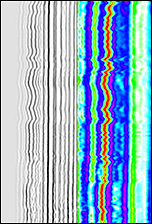
» Acoustic Televiewer (ATV) » Full Waveform Sonic » Cement Bond Log (CBL) » Crosshole Sonic » Variable Density Log (VDL) » Tube Wave Amplitude (TWA) » Velocity (Delta T)
More About Acoustic:
The principle of acoustic logging relies on the generation of the generation of high frequency sound waves and the interaction of these waves with formations. As a sound wave travels through rock, it reflects and refracts at interfaces. By recording the starting travel time and collecting the waves as they are seen by the receiver, information can be gathered and interpreted such as formation velocity, permeability, fracture identification, casing bond evaluation, rock strength properties, deposition environment and porosity.
![]() Download the ABI-40 & ABI-40-2G Spec Sheet
Download the ABI-40 & ABI-40-2G Spec Sheet
Electric & Magnetic
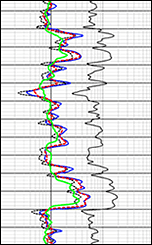
» Normal Resistivity » Single Point Resistance (SPR) » Spontaneous Potential (SP) » Lateral Resistivity » Guard (Focused) Resistivity » Induced Polarization (IP) » Induction (EM39) » Dual Induction » Magnetic Susceptibility » Borehole Radar
More About Electric & Magnetic
Information is provided by measuring potential differences caused by the flow of electricity through formations. By using different configurations of surface/downhole electrodes and multi-spaced electromagnetic coils, a variety of measurements can be obtained. These measurements are used for stratigraphic correlations, lithology and mineral identification, shale/clay content, porosity, and formation water quality.
Nuclear
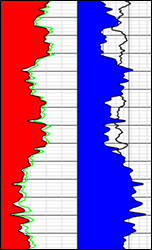
» Natural Gamma Neutron Porosity (Thermal and Epi-thermal) » Spectral Gamma (KUT) » Gamma-Gamma Density (Compensated, 4 Pi, and High Resolution)
More About Nuclear
Nuclear logging involves detection or creation of unstable isotopes in the vicinity of the borehole. Unique because they detect formation properties through casing, these logs can be used regardless of the presence of borehole fluids. The information obtained creates databases used for stratigraphic correlations, structure evaluation, depositional environment, shale/clay content, bulk density, rock strength, porosity, clay typing, mineral identification, moisture content, casing evaluation, well completion and radioactive contaminations.
Fluid
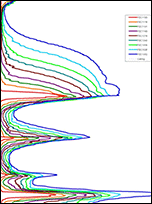
» Temperature/Differential Temperature » Fluid Resistivity/Conductivity » pH » Oxidation-Reduction Potential (ORP) » Flowmeter (Heat-Pulse, Spinner, CDFM) » HydroPhysical™ Well Logging (HpL™) » Water Quality Logging (WQL) » Discrete Interval Sampling
More About Fluid
Many different types of tools and techniques can be used for the determination of fluid flow conditions in a borehole, between boreholes and correlation of flow across sites. By quantifying interval specific flow rates, fluid temperature gradients, water level/water table information, and water quality issues, conclusions can be drawn as to the aquifer characterization, well production parameters, fracture inter-connectiveness, permeability, water contamination issues and well rehabilitation.
![]() Download the Corehole Dynamic Flowmeter (CDFM) Spec Sheet
Download the Corehole Dynamic Flowmeter (CDFM) Spec Sheet
![]() Download the Wireline Straddle-Packer (WSP) Spec Sheet
Download the Wireline Straddle-Packer (WSP) Spec Sheet
Imaging and Auxiliary
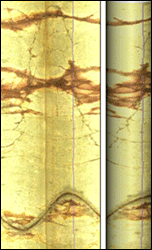
» Optical Televiewer » Casing Collar Locator » Deviation/ Inclination » Caliper/ Borehole Volume » Borehole Video
More About Imaging and Auxiliary
Auxiliary measurements are support logs. The majority of these tools have mechanical or optical measuring devices. Applications include borehole diameter/volume, breakouts/fracture identification, casing evaluations, fracture orientation/characterization, well deviation, magnetic anomalies, etc.
![]() Download the OBI-40 Spec Sheet
Download the OBI-40 Spec Sheet